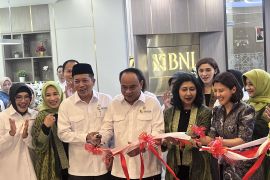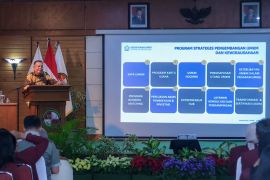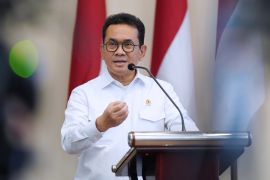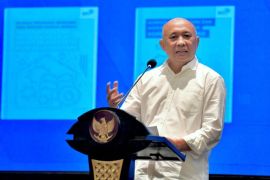"Traditional markets help to maintain Indonesia`s economic and social structure."Jakarta (ANTARA News) - Amidst the recent attacks on modern markets in Indonesia, the government is planning to revitalise traditional markets across the country to increase their competitiveness.
According to Neddy Rafinaldi Halim, deputy for marketing of cooperatives and small enterprises network at the Ministry of Cooperatives and Small and Medium Scale Businesses, the government will revitalise at least 175 traditional markets throughout the country.
"This year, the government will revitalise 175 traditional markets, consisting of 155 regular traditional markets, 15 regional mainstay product marketing facilities and 5 central traditional markets," said Neddy Rafinaldi Halim on Monday.
In the border areas, the government will revitalise at least 25 traditional markets, with funding from the ministry of cooperatives and medium and small scale enterprises.
"We are going to revitalise regional marketing facilities in 25 areas," said Neddy Rafinaldi Halim.
The ministry of cooperatives will renovate traditional markets. Revitalisation of traditional markets in border areas is important to accelerate economic and trade development in the country.
"Development of traditional markets will also help to improve the welfare of locals," he said.
He said until 2012, his office had revitalised 265 traditional markets in 207 cities in 32 provinces. As a result, more than 23,000 small traders had expanded their businesses, he said.
Small traders have more room for expansion, he added.
"With revitalisation, more supporting facilities will be available, including distribution systems for products manufactured by small businesses," he said.
"Traders have been able to increase the absorption capacity of workers. The total number of workers absorbed by traditional markets and cooperatives is 46,078," Neddy said.
He said revitalisation of traditional markets allows small scale businesses to have routine transactions.
He said by revitalising traditional markets, the government aims to increase the competitiveness of micro, small and medium scale businesses. With sufficient marketing facilities, competitiveness can be increased.
"Traditional markets help to maintain Indonesia`s economic and social structure," he said.
According to Neddy, traditional markets are popular among Indonesia`s lower and middle classes.
In the meantime, the local government of East Java, through the regional government`s market operator, PD Pasar Suraya, has set aside Rp7 billion to renovate at least 67 traditional markets in 2013.
The President Director of PD Pasar Surya, Karyanto Wibowo, said the budget amounting to Rp7 billion will be used to renovate more than 60 traditional markets and to improve their sewage systems.
Some of the traditional markets that will be revitalised in Surabaya are Pasar Pegirian, Manukan, Pasar Keputran Selatan and Tembok Dukuh. "These traditional markets have to be renovated because their sewage systems and roofs are damaged," he said.
He hopes that traditional markets in Surabaya will attract more tourists. "We hope that after the renovation, these traditional markets will regain their glory," he said.
The regional government of Yogyakarta is also keen on developing traditional markets in 2013. It will develop at least six traditional markets.
"We will develop six traditional markets in Prambanan, Sleman, Godean, Gamping, Kebonagung and Ngino," said the Head of the Sleman district`s market office, Tri Endah, on Thursday.
Tri Endah said the Prambanan Market will be developed close to the border of Klaten and Central Java in 2013. Rp7.2 billion will be used to develop the market. "The Prambanan Market will attract consumers who live beyond Yogyakarta," she said, adding that the Prambanan Market will be spread over 18,000 square meters.
"Currently, the district government of Sleman only has 2,000 square meters of land. The government will acquire additional land for Rp20 million," she said.
Tri Endah said the Prambanan Market will have one and a half floors. It will cost Rp7.2 billion to develop the Prambanan Market.
"We plan to build three floors. There will be a parking lot on each floor so that vendors can load and unload goods. At the Prambanan Market, there will be day care centres, restrooms and other facilities," she said.
She said other traditional markets will also be renovated.
"At the Godean Market, we will shift the fried eel shop to the district`s office area, which will be developed into a snacks centre," she said.
(T.A014/INE/KR-BSR/B003)
Reporter: by Andi Abdussalam
Editor: Priyambodo RH
Copyright © ANTARA 2013












